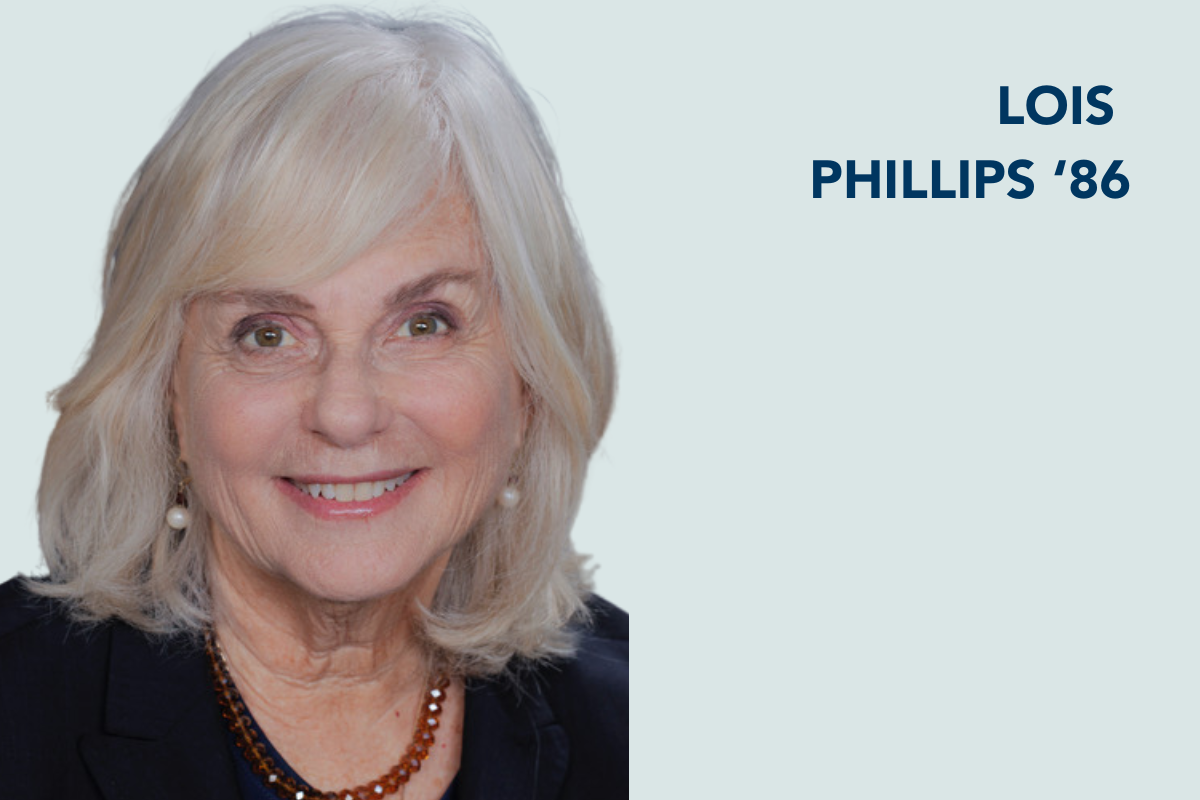
Lois Phillips ‘86 dedicated much of her career to the study of women and their behaviors in communication. Earning her Ph.D. from UCSB in the Philosophy of Education, Lois conducted three public speaking classes as part of her gender studies research. Upon graduating, Lois continued her professional stride as a consultant, both for Antioch University and independently. As a now semi-retired professional, Lois works with her current clients on tasks like speech writing and press preparation.
From co-authoring the book Women Seen and Heard: Lessons Learned from Successful Speakers to founding the Association for Women in Communications Santa Barbara Chapter, Lois has played a proactive role in the advancement of women in the workplace for decades.
As the founder of a consulting firm, what does your typical workday look like?
I am semi-retired now, so I keep my work projects limited. But, my typical work days include checking emails, returning calls, meeting with clients, and conducting research. I’ve learned a lot from being an independent contractor in this area. When you work for yourself as a consultant or coach, you can be busy 24 hours a day because you’re always thinking about your next client.
What have you learned most about yourself over the course of your career?
We all learn a lot from the feedback we get from other people. The feedback I’ve received most consistently, even in my senior years, is that I’m contagiously energetic. This empowers me to believe I can motivate my clients to think about their goals and be optimistic about their futures. Hearing that always makes me smile. That feedback makes me smile.
What memory do you look back on most fondly during your time at UCSB?
The conversations I had with my Doctoral Committee Chairperson, Larry Lannaccone, were very thought-provoking and intellectually stimulating. I learned a lot from him about the politics of organizational life. I also look back fondly on meeting students from all over the world who were also working towards advanced degrees.
You’ve accomplished a lot throughout your professional journey. What has been a career-defining moment in your lifetime?
Studying undergraduate communication at Queens College in New York gave me the skills for all of the big moments in my career, like being interviewed on the radio and speaking to the Chamber of Commerce. The broad nature of my undergraduate program exposed me to these communication skills that then allowed me to transition from one position to another later in life.
You established the Santa Barbara Chapter of Women in Communications and acted as its first president. Why did you feel it was important to activate such an organization in our area?
I was having lunch with some friends in the industry and we talked about the isolation we felt as independent consultants. We agreed that it would be great to have a network of women who are in the communications field for advice, community, and work opportunities. We approached the creation of the chapter experimentally as we decided to host a luncheon for the founder of the Santa Barbara International Film Festival, Phyllis de Picciotto. At that event, we asked the attendees if they would like to be a part of this new Women’s Chapter. We started with 35 members, and have since grown to include journalists, public relations professionals, public information officers, and corporate communications leaders.
What drew you to Santa Barbara to earn your PhD in Education?
I had been living in the area for years prior, so I entered the Gevirtz Graduate School of Education with the intent of studying organizational behavior and leadership. However, it was in that program that I went back to my first love, Gender Studies. Much of my work had already been centered around women in the workplace and the changing nature of the family unit, but I felt strongly that women’s ability to speak in public was critical to our advancement. I conducted three public speaking classes at UCSB as the basis of my research, which eventually focused on masculinity, femininity, and androgyny at the podium.
What advice would you give to those in your industry just starting their post-grad journeys?
I would say to keep communicating and don’t rely on your devices as the only strategy to be in touch with others. There is nothing like the complicated exchange between people that involves the whole body of the communicator standing in front of you. Interpreting and cultivating interpersonal skills so that you can work in a team is extremely important in order to lead meetings, facilitate decision-making, and communicate results. Secondly, I recommend being open to feedback. Sometimes, it’ll be painful because the feedback will be surprising, but soliciting feedback is a courageous act.